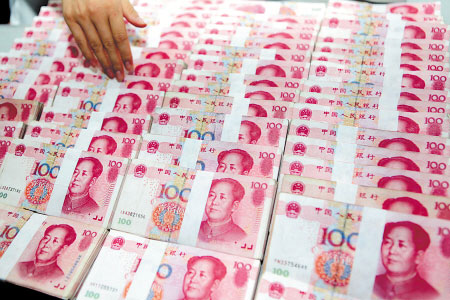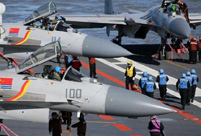


Accelerated capital outflow in the past year resulted in record high net sales of $465.9 billion in foreign exchange from banks on the Chinese mainland, the central government reported on Thursday.
The State Administration of Foreign Exchange, China's top currency trade regulator, said the volume of the capital outflow was in part brought on by the US Federal Reserve raising interest rates.
The SAFE said the outflow is still manageable and cannot threaten the overall health of the financial system.
In December, mainland banks reported net sales of $89.4 billion in foreign exchange, showing the third-largest deficit-or proportion of sales to purchases-of foreign currency on record.
In contrast, it showed a surplus of $125.8 billion in 2014 and $270.2 billion in 2013 in large capital inflows.
SAFE spokeswoman Wang Chunying said on Thursday that the Fed's increase of the interest rate accelerated capital outflows from China and other emerging economies. "But we are better prepared than some emerging countries to resist external shocks." However, economists expected the capital outflows to continue in 2016, as there have been no signs of reduced downward pressure on economic growth after GDP hit a 25-year low of 6.9 percent, and the renminbi may further depreciate against the US dollar.
Louis Kuijs, an economist at Oxford Economics, a commercial venture with Oxford University's business college predicted that the renminbi will further weaken by 3.5 percent to 6.8 yuan per US dollar by the third quarter this year. "Capital outflows will continue to exert downward pressure on the currency," he said.
Along with the dramatic capital outflows, Chinese foreign exchange reserves sharply decreased by $512.7 billion last year, to $3.33 trillion-though it remains the world's largest foreign reserves.
According to the SAFE, $253.8 of the reduction in the reserves was from Chinese non-banking enterprises and individuals, coming from direct overseas investment, overseas equity investment under the Qualified Domestic Institutional Investor scheme, repayment of foreign debt and outbound tourism and consumption.
The central bank's sale of foreign exchange on the currency market to stabilize the renminbi's exchange rate also contributed to the decline, the SAFE said without disclosing the specific amount.
"So far, the amount of China's foreign exchange reserve is sufficient and strong enough to resist shocks from overseas," the SAFE spokeswoman said.
Li Daokui, an economics professor at Tsinghua University, said earlier that at least $3 trillion foreign exchange reserves in China is required to prevent foreign debt default risk.
A research note from Barclay's Capital predicted that the minimum foreign exchange reserves should remain at $2.75 trillion.
 PLA holds joint air-ground military drill
PLA holds joint air-ground military drill Charming female soldiers on Xisha Islands
Charming female soldiers on Xisha Islands Beautiful skiers wear shorts in snow
Beautiful skiers wear shorts in snow Getting close to the crew on China's aircraft carrier
Getting close to the crew on China's aircraft carrier Chinese stewardess celebrate test flight at Nansha Islands
Chinese stewardess celebrate test flight at Nansha Islands World's first 'underwater skyscraper'
World's first 'underwater skyscraper'  Pentagonal Mart becomes the largest vacant building in Shanghai
Pentagonal Mart becomes the largest vacant building in Shanghai "Rent me as your girlfriend!"
"Rent me as your girlfriend!" A beauty's dancing youth
A beauty's dancing youth Top 20 hottest women in the world in 2014
Top 20 hottest women in the world in 2014 Top 10 hardest languages to learn
Top 10 hardest languages to learn 10 Chinese female stars with most beautiful faces
10 Chinese female stars with most beautiful faces China’s Top 10 Unique Bridges, Highways and Roads
China’s Top 10 Unique Bridges, Highways and Roads Old problems
Old problems US firms still optimistic about China: survey
US firms still optimistic about China: survey  Tribunal’s award in Philippines’ case turns blind eye to facts
Tribunal’s award in Philippines’ case turns blind eye to facts Commuters encouraged to put down their phones, pick up books
Commuters encouraged to put down their phones, pick up books Day|Week